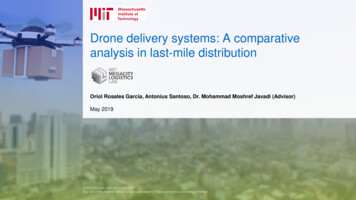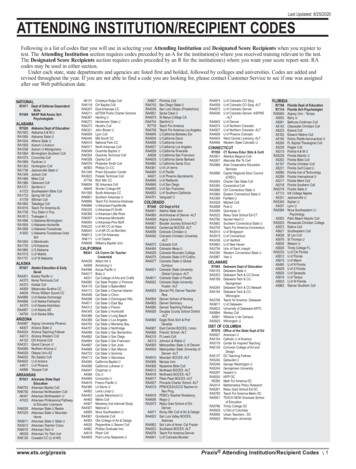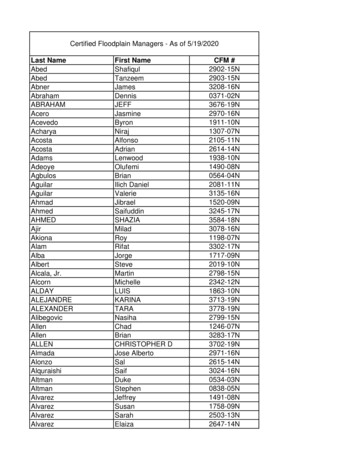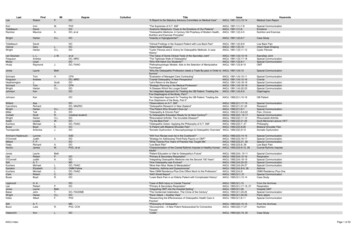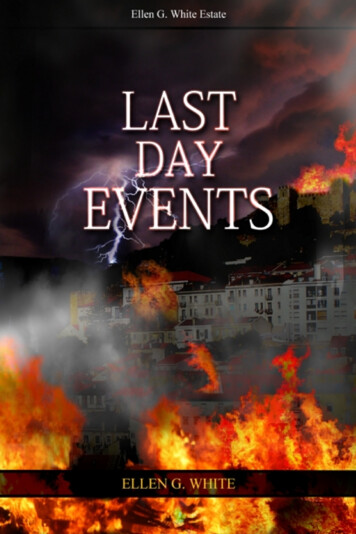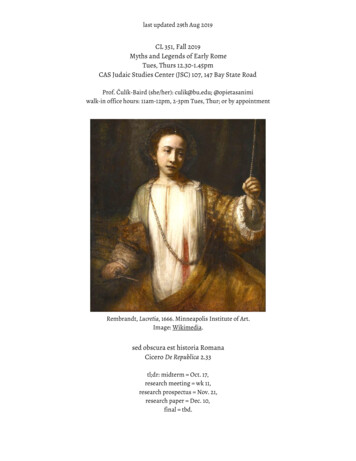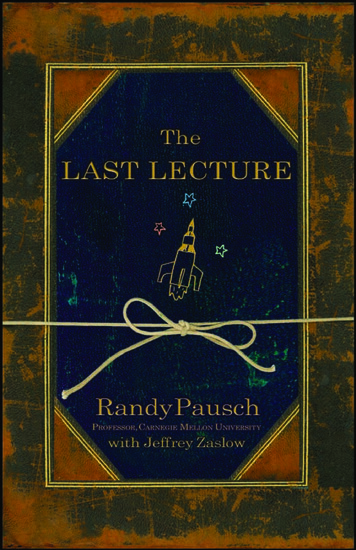
Transcription
THE LASTLECTURER A N D Y PAUSCHPROFESSOR, CARNEGIE MELLONwithJ E F F R EY Z A S LOW
With thanks to my parents who allowed me to dream,and with hopes for the dreams my children will have.
ContentsIntroductionI. The Last Lectureiv1II. Really Achieving Your ChildhoodDreams19III. Adventures . . . and Lessons Learned55IV. Enabling the Dreams of Others105V. It’s About How to Live Your Life129VI. Final Remarks189Acknowledgments207About the AuthorsCreditsCoverCopyright
IntroductionIhave an engineering problem.While for the most part I’m in terrific physical shape, Ihave ten tumors in my liver and I have only a few months leftto live.I am a father of three young children, and married to thewoman of my dreams. While I could easily feel sorry for myself, that wouldn’t do them, or me, any good.So, how to spend my very limited time?The obvious part is being with, and taking care of, myfamily. While I still can, I embrace every moment with them,and do the logistical things necessary to ease their path into alife without me.The less obvious part is how to teach my children what Iwould have taught them over the next twenty years. They aretoo young now to have those conversations. All parents wantto teach their children right from wrong, what we think isimportant, and how to deal with the challenges life will bring.We also want them to know some stories from our own lives,
vIntroductionoften as a way to teach them how to lead theirs. My desire todo that led me to give a “last lecture” at Carnegie MellonUniversity.These lectures are routinely videotaped. I knew what I wasdoing that day. Under the ruse of giving an academic lecture,I was trying to put myself in a bottle that would one daywash up on the beach for my children. If I were a painter, Iwould have painted for them. If I were a musician, I wouldhave composed music. But I am a lecturer. So I lectured.I lectured about the joy of life, about how much I appreciated life, even with so little of my own left. I talked abouthonesty, integrity, gratitude, and other things I hold dear.And I tried very hard not to be boring.This book is a way for me to continue what I began onstage. Because time is precious, and I want to spend all that Ican with my kids, I asked Jeffrey Zaslow for help. Each day,I ride my bike around my neighborhood, getting exercisecrucial for my health. On fifty-three long bike rides, I spoketo Jeff on my cell-phone headset. He then spent countlesshours helping to turn my stories—I suppose we could callthem fifty-three “lectures”—into the book that follows.We knew right from the start: None of this is a replacement for a living parent. But engineering isn’t about perfectsolutions; it’s about doing the best you can with limited resources. Both the lecture and this book are my attempts to doexactly that.
ITHE LASTLECTURE
1An Injured LionStill Wants to RoarAlot of professors give talks titled “The Last Lecture.”Maybe you’ve seen one.It has become a common exercise on college campuses.Professors are asked to consider their demise and to ruminateon what matters most to them. And while they speak, audiences can’t help but mull the same question: What wisdomwould we impart to the world if we knew it was our lastchance? If we had to vanish tomorrow, what would we wantas our legacy?For years, Carnegie Mellon had a “Last Lecture Series.”But by the time organizers got around to asking me to do it,they’d renamed their series “Journeys,” asking selected professors “to offer reflections on their personal and professionaljourneys.” It wasn’t the most exciting description, but Iagreed to go with it. I was given the September slot.At the time, I already had been diagnosed with pancreaticcancer, but I was optimistic. Maybe I’d be among the luckyones who’d survive.
4the last lectureWhile I went through treatment, those running the lecture series kept sending me emails. “What will you be talkingabout?” they asked. “Please provide an abstract.” There’s aformality in academia that can’t be ignored, even if a man isbusy with other things, like trying not to die. By mid-August,I was told that a poster for the lecture had to be printed, so I’dhave to decide on a topic.That very week, however, I got the news: My most recenttreatment hadn’t worked. I had just months to live.I knew I could cancel the lecture. Everyone would understand. Suddenly, there were so many other things to be done.I had to deal with my own grief and the sadness of those wholoved me. I had to throw myself into getting my family’s affairs in order. And yet, despite everything, I couldn’t shakethe idea of giving the talk. I was energized by the idea of delivering a last lecture that really was a last lecture. What couldI say? How would it be received? Could I even get through it?“They’ll let me back out,” I told my wife, Jai, “but I reallywant to do it.”Jai (pronounced “Jay”) had always been my cheerleader.When I was enthusiastic, so was she. But she was leery of thiswhole last-lecture idea. We had just moved from Pittsburghto Southeastern Virginia so that after my death, Jai and thekids could be near her family. Jai felt that I ought to be spending my precious time with our kids, or unpacking our newhouse, rather than devoting my hours to writing the lectureand then traveling back to Pittsburgh to deliver it.“Call me selfish,” Jai told me. “But I want all of you. Any
An Injured Lion Still Wants to Roar5Logan, Chloe, Jai, myself, and Dylan.time you’ll spend working on this lecture is lost time, becauseit’s time away from the kids and from me.”I understood where she was coming from. From the timeI’d gotten sick, I had made a pledge to myself to defer to Jaiand honor her wishes. I saw it as my mission to do all I couldto lessen the burdens in her life brought on by my illness.
6the last lectureThat’s why I spent many of my waking hours makingarrangements for my family’s future without me. Still, Icouldn’t let go of my urge to give this last lecture.Throughout my academic career, I’d given some prettygood talks. But being considered the best speaker in acomputer science department is like being known as thetallest of the Seven Dwarfs. And right then, I had the feelingthat I had more in me, that if I gave it my all, I might be ableto offer people something special. “Wisdom” is a strong word,but maybe that was it.Jai still wasn’t happy about it. We eventually took the issueto Michele Reiss, the psychotherapist we’d begun seeing a fewmonths earlier. She specializes in helping families when onemember is confronting a terminal illness.“I know Randy,” Jai told Dr. Reiss. “He’s a workaholic. Iknow just what he’ll be like when he starts putting the lecturetogether. It’ll be all-consuming.” The lecture, she argued,would be an unnecessary diversion from the overwhelmingissues we were grappling with in our lives.Another matter upsetting Jai: To give the talk as scheduled, I would have to fly to Pittsburgh the day before, whichwas Jai’s forty-first birthday. “This is my last birthday we’llcelebrate together,” she told me. “You’re actually going toleave me on my birthday?”Certainly, the thought of leaving Jai that day was painfulto me. And yet, I couldn’t let go of the idea of the lecture. Ihad come to see it as the last moment of my career, as a wayto say goodbye to my “work family.” I also found myself fan-
An Injured Lion Still Wants to Roar7tasizing about giving a last lecture that would be the oratorical equivalent of a retiring baseball slugger driving one lastball into the upper deck. I had always liked the final scenein The Natural, when the aging, bleeding ballplayer RoyHobbs miraculously hits that towering home run.Dr. Reiss listened to Jai and to me. In Jai, she said, she sawa strong, loving woman who had intended to spend decadesbuilding a full life with a husband, raising children to adulthood. Now our lives together had to be squeezed into a fewmonths. In me, Dr. Reiss saw a man not yet ready to fully retreat to his home life, and certainly not yet ready to climbinto his deathbed. “This lecture will be the last time manypeople I care about will see me in the flesh,” I told her flatly.“I have a chance here to really think about what matters mostto me, to cement how people will remember me, and to dowhatever good I can on the way out.”More than once, Dr. Reiss had watched Jai and me sit together on her office couch, holding tightly to each other, bothof us in tears. She told us she could see the great respect between us, and she was often viscerally moved by our commitment to getting our final time together right. But she said itwasn’t her role to weigh in on whether or not I gave the lecture. “You’ll have to decide that on your own,” she said, andencouraged us to really listen to each other, so we could makethe right decision for both of us.Given Jai’s reticence, I knew I had to look honestly at mymotivations. Why was this talk so important to me? Was it away to remind me and everyone else that I was still very much
8the last lecturealive? To prove I still had the fortitude to perform? Was it alimelight-lover’s urge to show off one last time? The answerwas yes on all fronts. “An injured lion wants to know if he canstill roar,” I told Jai. “It’s about dignity and self-esteem, whichisn’t quite the same as vanity.”There was something else at work here, too. I had startedto view the talk as a vehicle for me to ride into the future Iwould never see.I reminded Jai of the kids’ ages: five, two and one. “Look,”I said. “At five, I suppose that Dylan will grow up to have afew memories of me. But how much will he really remember?What do you and I even remember from when we were five?Will Dylan remember how I played with him, or what he andI laughed about? It may be hazy at best.“And how about Logan and Chloe? They may have nomemories at all. Nothing. Especially Chloe. And I can tellyou this: When the kids are older, they’re going to gothrough this phase where they absolutely, achingly need toknow: ‘Who was my dad? What was he like?’ This lecturecould help give them an answer to that.” I told Jai I’d makesure Carnegie Mellon would record the lecture. “I’ll getyou a DVD. When the kids are older, you can show it tothem. It’ll help them understand who I was and what I caredabout.”Jai heard me out, then asked the obvious question. “If youhave things you want to say to the kids, or advice you want togive them, why not just put a video camera on a tripod andtape it here in the living room?”
An Injured Lion Still Wants to Roar9Maybe she had me there. Or maybe not. Like that lion inthe jungle, my natural habitat was still on a college campus,in front of students. “One thing I’ve learned,” I told Jai, “isthat when parents tell children things, it doesn’t hurt to getsome external validation. If I can get an audience to laughand clap at the right time, maybe that would add gravitas towhat I’m telling the kids.”Jai smiled at me, her dying showman, and finally relented.She knew I’d been yearning to find ways to leave a legacy forthe kids. OK. Perhaps this lecture could be an avenue forthat.And so, with Jai’s green light, I had a challenge before me.How could I turn this academic talk into something thatwould resonate with our kids a decade or more up the road?I knew for sure that I didn’t want the lecture to focuson my cancer. My medical saga was what it was, and I’d already been over it and over it. I had little interest in giving adiscourse on, say, my insights into how I coped with the disease, or how it gave me new perspectives. Many people mightexpect the talk to be about dying. But it had to be about living.* * *“What makes me unique?”That was the question I felt compelled to address. Maybeanswering that would help me figure out what to say. I wassitting with Jai in a doctor’s waiting room at Johns Hopkins,awaiting yet another pathology report, and I was bouncingmy thoughts off her.“Cancer doesn’t make me unique,” I said. There was no
10the last lecturearguing that. More than 37,000 Americans a year are diagnosed with pancreatic cancer alone.I thought hard about how I defined myself: as a teacher, acomputer scientist, a husband, a father, a son, a friend, abrother, a mentor to my students. Those were all roles I valued. But did any of those roles really set me apart?Though I’ve always had a healthy sense of self, I knew thislecture needed more than just bravado. I asked myself: “Whatdo I, alone, truly have to offer?”And then, there in that waiting room, I suddenly knew exactly what it was. It came to me in a flash: Whatever my accomplishments, all of the things I loved were rooted in thedreams and goals I had as a child . . . and in the ways I hadmanaged to fulfill almost all of them. My uniqueness, I realized, came in the specifics of all the dreams—from incrediblymeaningful to decidedly quirky—that defined my forty-sixyears of life. Sitting there, I knew that despite the cancer, Itruly believed I was a lucky man because I had lived out thesedreams. And I had lived out my dreams, in great measure, because of things I was taught by all sorts of extraordinary people along the way. If I was able to tell my story with thepassion I felt, my lecture might help others find a path to fulfilling their own dreams.I had my laptop with me in that waiting room, and fueledby this epiphany, I quickly tapped out an email to the lectureorganizers. I told them I finally had a title for them. “Myapologies for the delay,” I wrote. “Let’s call it: ‘Really Achieving Your Childhood Dreams.’ ”
2My Life in a LaptopHow, exactly, do you catalogue your childhooddreams? How do you get other people to reconnectwith theirs? As a scientist, these weren’t the questions I typically struggled with.For four days, I sat at my computer in our new home inVirginia, scanning slides and photos as I built a PowerPointpresentation. I’ve always been a visual thinker, so I knew thetalk would have no text—no word script. But I ama
tasizing about giving a last lecture that would be the oratori-cal equivalent of a retiring baseball slugger driving one last ball into the upper deck. I had always liked the final scene in The Natural, when the aging, bleeding ballplayer Roy Hobbs miraculously hits that towering home run. Dr. Reiss listened to Jai and to me. In Jai, she said, she saw a strong, loving woman who had intended .

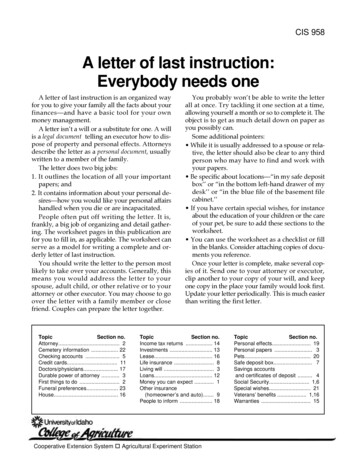
![Last or Business First [Maiden] Page Title Notes](/img/1/saukcity125thjubilee-20historical-20album-index.jpg)
